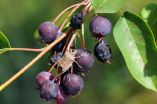(Press-News.org) When it comes to the art of persuasion, you can attract more followers if you turn conventional wisdom on its head and stress what you like, not what you do.
A new study, to be published in an upcoming issue of the Journal of Personality and Social Psychology, finds that people are more likely to conform to others' preferences than conform to others' actions. In other words, people want to like what others like, but they want to have or do what others don't have or don't do.
In the study, "Words Speak Louder: Conforming to Preferences More Than Actions," by University of Chicago Booth School of Business Professor Ayelet Fishbach and former Chicago Booth PhD student Yanping Tu, researchers designed a series of six experiments involving everyday activities such as choosing a type of chewing gum, shopping for groceries, picking a favorite mug design and watching a pet video on YouTube.
"The tendency to conform is pervasive and rooted in human psychology," said Fishbach. "When people conform, they conform to what others like and to others' attitudes. But in terms of what they do, they want to be different. So if you want to persuade people, you should talk about liking, not about having."
The researchers found that people conform to others' preferences at last partially because they adopt others' judgments as their own. They further found that when people behave as if they are not conforming, their motivation could be to coordinate or complement their actions with others' actions.
For example, when people mentally share an action, such as watching a friend eat a bowl of oatmeal over breakfast, they feel in a way that they ate the oatmeal too, so they seek to enrich their own experience by choosing something that is different, such as an omelet. But when people mentally share another person's preference, such as liking oatmeal more than omelets, they adopt the others' preference as their own and say they like oatmeal more than omelets.
Even when information about others' preferences and actions are available at the same time--such as an online shopping site that lists both its bestselling products and its most liked products--people are more likely to follow what others like, rather than what others buy.
The research has implications for online shopping, social media marketing and political campaigns. Marketers, for example, could collect "likes" from Facebook users, rather than collecting information on what users buy, eat or own. Likewise, they could present products as "everyone likes it," rather than "everyone buys it."
INFORMATION:
Contact: Professor Fishbach is available for comment at Ayelet.Fishbach@chicagobooth.edu or 773-834-8673.
From: Susan Guibert, Chicago Booth Office of Media Relations, 773-702-9232 or 574-286-4839, Susan.Guibert@chicagobooth.edu.
DURHAM, N.C. - Researchers at Duke University School of Medicine and Brigham and Women's Hospital, Harvard Medical School have identified a mechanism that explains why some mutations can be disease-causing in one genome but benign in another.
In a study appearing June 29, 2015, in the journal Nature, the researchers compared thousands of human disease-causing mutations with the analogous sequences of some 100 animal species. They discovered non-human genomes carrying mutations that cause severe disease in humans, yet were benign in the animals.
Although generally in ...
The brown marmorated stink bug has a bad reputation. And for good reason: every summer, this pest attacks crops and invades homes, causing both sizable economic losses and a messy, smelly nuisance--especially in the eastern United States. A new study by entomologists at the University of Maryland shows that these pests, known simply as stink bugs, have a strong preference for ripe fruit. Moreover, stink bugs track their favorite fruits throughout the growing season in an effort to maximize their access to food.
The study, published online June 25, 2015 in the Journal ...
PHILADELPHIA -- Since their discovery in the 1950s, transfer RNAs (tRNAs) have been best known for their role in helping the cell make proteins from messenger RNA templates. However, recent studies have led to a previously-unsuspected concept that tRNAs are not always the end product; namely, they further serve as a source of small RNAs. Now researchers have discovered a new species of tRNA-derived small RNAs that are produced only in hormonally-driven breast and prostate cancers, and which contribute to cell proliferation. The results will be published online the week ...
The warm temperature on a summer's day is often a time for relaxing, but researchers from the University of Leicester have suggested that a 'thermosensory' gene could be responsible for changes in behaviour in different climates.
The researchers from the University of Leicester's Department of Genetics have explored how the biological clock can be affected by the environment by examining the fruitfly Drosophila melanogaster, which shows 24 hour biological cycles and is used as a model organism for studies into human rhythms.
Like many humans, the fly has a 'siesta' ...
It's been difficult to explain patterns of toxic mercury in some parts of the world, such as why there's so much of the toxin deposited into ecosystems from the air in the southeastern United States, even upwind of usual sources.
A new analysis led by researchers at the University of Colorado Boulder shows that one key to understanding mercury's strange behavior may be the unexpected reactivity of naturally occurring halogen compounds from the ocean.
"Atmospheric chemistry involving bromine and iodine is turning out to be much more vigorous than we expected," said ...
A University of Oklahoma professor studying malaria mosquito interaction has discovered a new mosquito protein for the development of a new vaccine that is expected to stop the spread of the disease in areas where it is considered endemic. Malaria is transmitted by mosquitoes, and it infects millions of people in Africa, Asia and South America every year, causing a global health crisis. In addition to the local populations, U.S. military personnel stationed in these areas and travelers to these malaria-prone areas are at risk of becoming infected.
Jun Li, assistant ...
UC Santa Barbara geologist Jim Boles has found evidence of helium leakage from the Earth's mantle along a 30-mile stretch of the Newport-Inglewood Fault Zone in the Los Angeles Basin. Using samples of casing gas from two dozen oil wells ranging from LA's Westside to Newport Beach in Orange County, Boles discovered that more than one-third of the sites -- some of the deepest ones -- show evidence of high levels of helium-3 (3He).
Considered primordial, 3He is a vestige of the Big Bang. Its only terrestrial source is the mantle. Leakage of 3He suggests that the Newport-Inglewood ...
WASHINGTON (June 29, 2015) -The American College of Cardiology, Heart Rhythm Society and Society for Cardiovascular Angiography and Interventions today released a new overview on the implantation of left atrial appendage occlusion devices.
The implantation of left atrial appendage occlusion devices may lower the risk of stroke in patients with atrial fibrillation. As new devices are developed, it is anticipated that the use of left atrial appendage occlusion technologies in clinical practice will expand. The authors of the paper urge that the new technology should be ...
Stringing together meaningless sounds to create meaningful signals was previously thought to be the preserve of humans alone, but a new study, publishing June 29th in the Open Access journal PLOS Biology, has revealed that babbler birds are also able to communicate in this way.
Researchers at the Universities of Exeter and Zurich discovered that the chestnut-crowned babbler - a highly social bird found in the Australian Outback - has the ability to convey new meaning by rearranging the meaningless sounds in its calls. This babbler bird communication is reminiscent of ...
LAKEVILLE-MIDDLEBORO, Mass., (June 29, 2015) - A new study (1) reveals that drinking low-calorie cranberry juice cocktail may help lower the risk of chronic diseases that rank among the leading causes of death worldwide, including heart disease, diabetes and stroke. The finding is welcome news considering the World Health Organization estimates the trio of diseases annually claim 15.6 million lives around the globe (2). These illnesses are among the most common and costly health conditions, but fortunately, they are also among the most preventable through dietary intervention. ...


